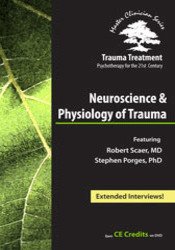

Linda A. Curran, BCPC, LPC, CAC-D, CCDPD, EMDR-C, sought after national trainer, best-selling author and film producer, has trained thousands of mental health clinicians across the country on trauma treatment. She is President of Integrative Trauma Treatment, LLC, in Havertown, PA. With advanced degrees in both clinical psychology and public health, Linda is a Board Certified, Licensed Professional Counselor; Certified Addiction Counselor Diplomate; Certified Co-Occurring Professional Diplomate; Certified Gestalt Therapist; Certified Neurofeedback Practitioner; Certified Hypnotherapist; and Level II EMDR Practitioner.
International speaker on the treatment of trauma, author of both Trauma Competency: A Clinicians Guide and 101 Trauma-Informed Interventions, Linda has developed, produced, and presents multi-media workshops on all aspects of psychological trauma. Her latest projects include the completion of www.trauma101.com (an extensive trauma resource for clinicians and clients alike), along with nine completed video projects for The Master Clinician Series. Linda continues to advocate for accessible, coherent, integrative trauma treatment for all those affected by trauma.
Speaker Disclosures:

Stephen W. Porges, PhD, is a distinguished University Scientist at Indiana University, where he is the founding director of the Traumatic Stress Research Consortium within the Kinsey Institute. He holds the position of Professor of Psychiatry at the University of North Carolina and Professor Emeritus at the University of Illinois at Chicago and the University of Maryland, and is a founder of the Polyvagal Institute. Dr. Porges served as president of both the Society for Psychophysiological Research and the Federation of Associations in Behavioral & Brain Sciences and is a former recipient of a National Institute of Mental Health Research Scientist Development Award. He has published approximately 400 peer-reviewed scientific papers across several disciplines including anesthesiology, biomedical engineering, critical care medicine, ergonomics, exercise physiology, gerontology, neurology, neuroscience, obstetrics, pediatrics, psychiatry, psychology, psychometrics, space medicine, and substance abuse. His research has been cited in more than 50,000 peer-review publications. In 1994, Dr. Porges proposed the Polyvagal Theory, a theory that links the evolution of the mammalian autonomic nervous system to social behavior and emphasizes the importance of physiological state in the expression of behavioral problems and psychiatric disorders. The theory is leading to innovative treatments based on insights into the mechanisms mediating symptoms observed in several behavioral, psychiatric, and physical disorders.
He is the author of The Polyvagal Theory: Neurophysiological foundations of Emotions, Attachment, Communication, and Self-Regulation (Norton, 2011), The Pocket Guide to the Polyvagal Theory: The Transformative Power of Feeling Safe (Norton, 2017), Polyvagal Safety (Norton, 2021), co-author with Seth Porges of Our Body Polyvagal World (Norton, 2023), and co-editor with Deb Dana of Clinical Applications of the Polyvagal Theory: The Emergence of Polyvagal-Informed Therapies (Norton, 2018). Dr. Porges is also the creator of a music-based intervention, the Safe and Sound Protocol™, which currently is used by approximately 3,000 therapists to improve spontaneous social engagement, to reduce hearing sensitivities, and to improve language processing, state regulation, and spontaneous social engagement.
Speaker Disclosures:
Access never expires for this product.
| 5 |
|
| 4 |
|
| 3 |
|
| 2 |
|
| 1 |
|
Satisfaction Guarantee
Your satisfaction is our goal and our guarantee. Concerns should be addressed to: PO Box 1000, Eau Claire, WI 54702-1000 or email info@pesi.com.au.
Please wait ...